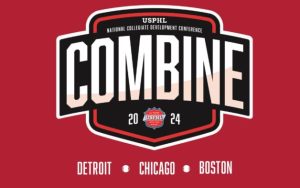Bobcats see positive benefits to spring, summer programs

The team leading the Arizona Bobcats knows just how important the hockey offseason can be to players’ development.
Because of that, hockey director Ron Filion and his staff place a heavy emphasis on providing outstanding spring and summer programming for their young players.
While players aren’t required to participate in offseason training, the Bobcats offer a variety of camps, clinics and individual training options to help players develop their skills. While individual skills are taught and practiced during the season, often the focus from September through March is on team play, learning systems and preparing for the next game or tournament, but during the offseason, coaches can work with individual players to help develop specific skills that they can take into the next season and make them better players.
“Skills can get overlooked during the season,” said Brent Gough, the head coach of the Bobcats’ 18U team. “You always want to work on more skill development, but there is so much to teach. There’s some skill training that you can work on during the spring and summer that can really help you elevate your game.”
Added Filion: “We believe that summer training should be tailored to each age group. Players 13 years old and up should start thinking about a more intense workout related to the sport of hockey and focusing on junior and USA camps coming up for them. Younger players are still at the stage where they are developing as athletes, so participating in other sports is important. One or two hockey summer camps and a few skating lessons here and there is good enough during the offseason. Taking a month off is also something we recommend to our younger groups.”
The Bobcats offer an eight-week skills program for older players as well as a one-week camp for younger players. The eight-week sessions run from March 6-May 5 for players aged 7-19, with players attending sessions two nights per week. The first night each week focuses on power skating and other skill sessions in small groups, with the second night dedicated to scrimmaging. There’s also an additional goalie-specific session each week.
The one-week camp runs June 26-30 from 8 a.m.-4 p.m. each day, with a similar focus as the longer camps, but adding in dry land training, plyometrics, team-building exercises and personal goal setting.
Jason Oliver, who coaches the Bobcats’ 14U AAA team and has two sons in the program, is also heavily involved in the off-season training. He’s an advocate of encouraging kids to take time away from the ice to play other sports, but also feels that spending some time during the spring and summer to work on skills can be very beneficial to young players.
“You can work at the pace that is best for you, rather than the pace that the team is on like you would during the season,” Oliver said. “The focus is really on individual skating, edge work, shooting and other skills that will help kids develop as individual players.”
In addition to the camps offered by the Bobcats, Filion plans to take a group of players from the 2005 birth year and younger to Chicago for a camp. Gough will take a group of older players to a pre-draft showcase in Boston in May, and will travel to Vancouver with a 2003 team Memorial Day Weekend. He’ll take two teams of 2001 and 2002 players to Boston for the Junior Chowder Cup tournament in July.
Gough will also put on his exposure camp June 24-27, with six teams of players 14-19 years old expected, where they receive coaching from and get seen by a number of college coaches in Gough’s network.
“All the kids want to play in college, so it’s good to get out there to play against some top players and be seen by some coaches and scouts,” Gough said.
— Greg Ball








